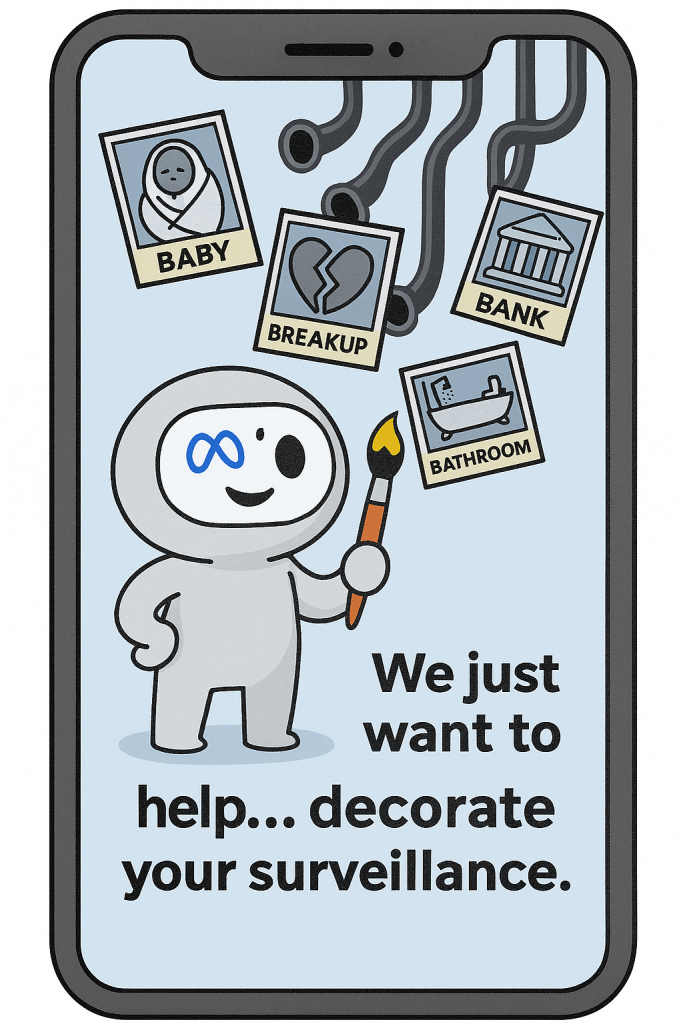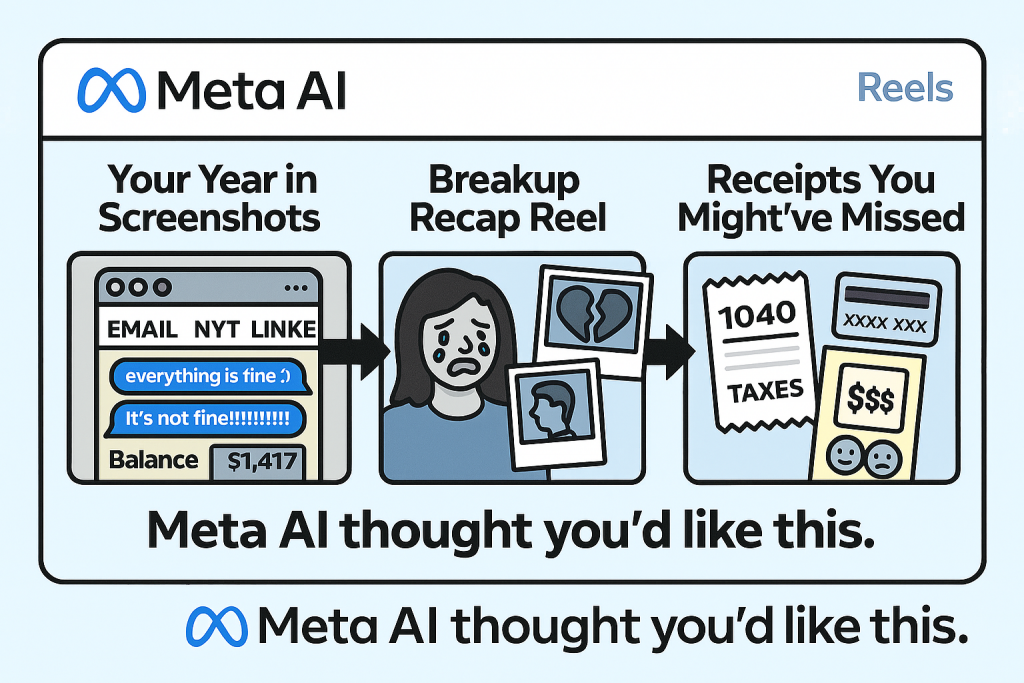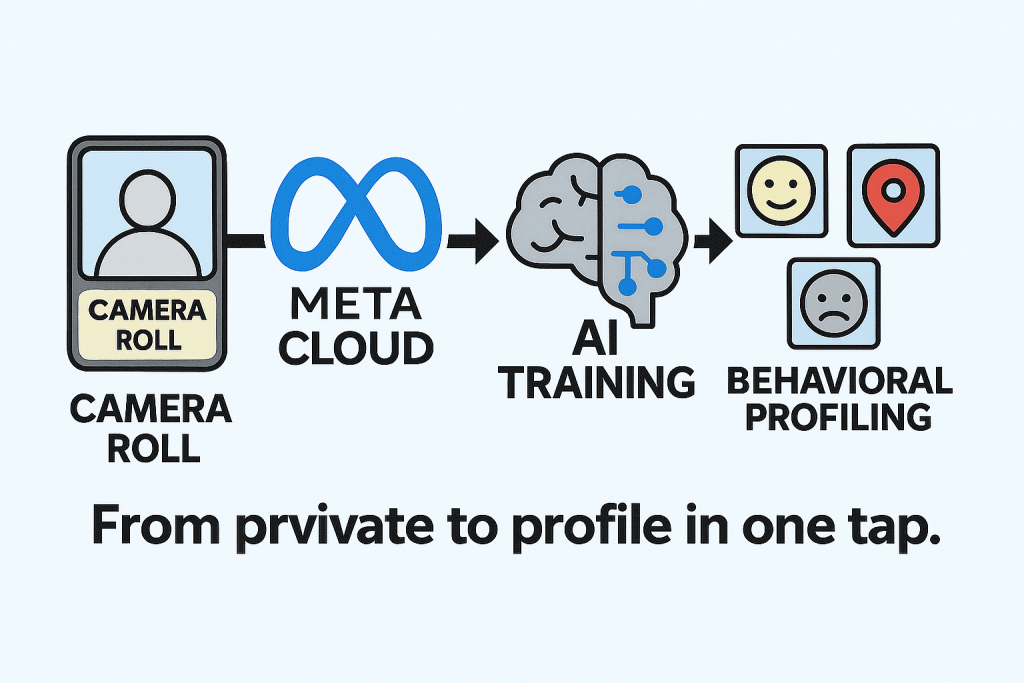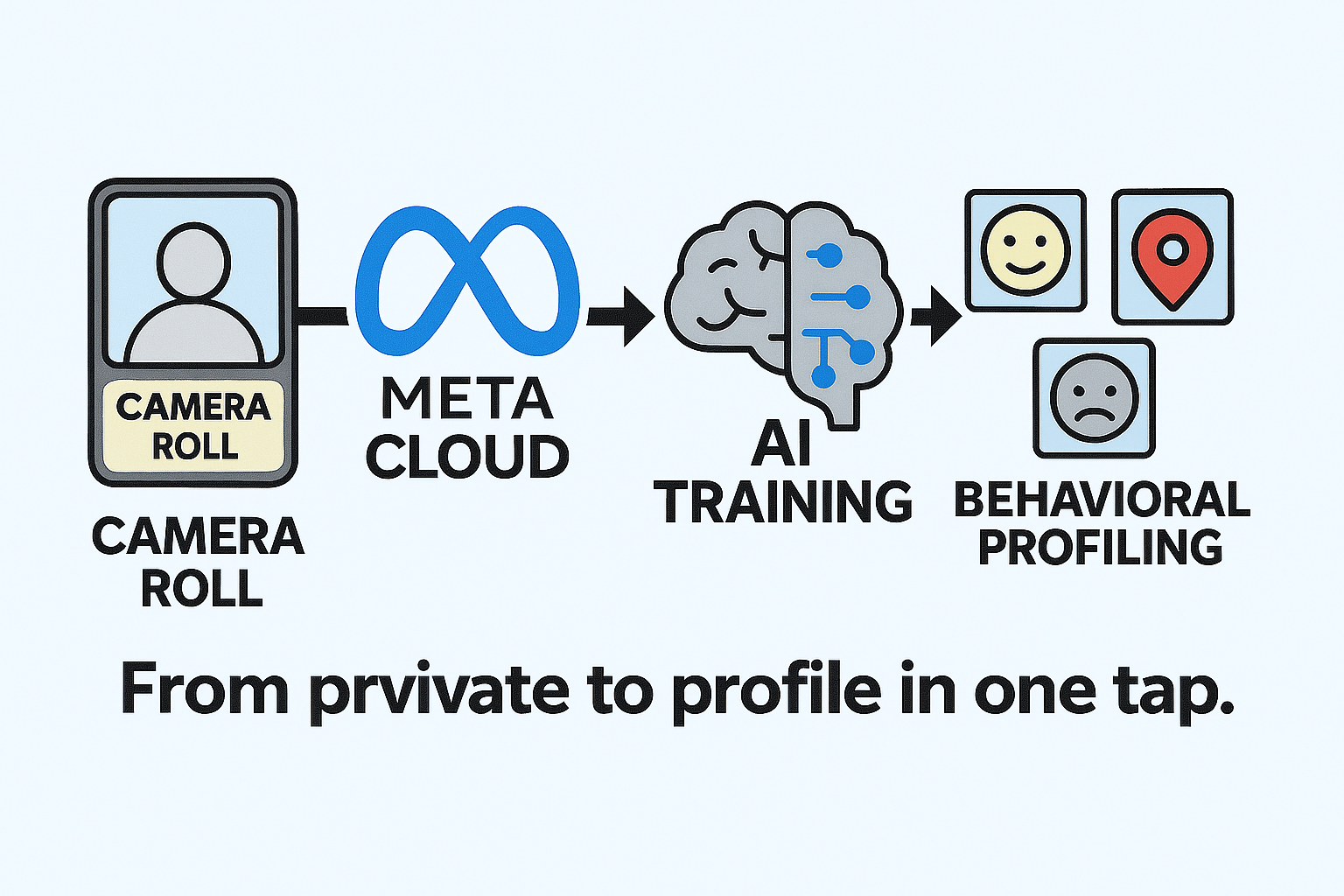Meta’s AI Wants Your Memories — And Your Metadata; Meta’s new AI photo feature isn’t about creativity — it’s about control. By asking for access to your camera roll, Meta isn’t just offering edits. It’s building a dataset. One that includes your private moments, your relationships, your routines. And once you tap “Allow,” your phone becomes a surveillance node.

🕵️♂️ What Meta’s AI is Really Doing with Your Camera Roll
📸 The Feature at a Glance
- Meta AI now scans your entire camera roll, not just posted content.
- It offers “creative suggestions” like collages, recaps, and themed edits.
- To do this, it uploads your photos to Meta’s cloud for processing.
🚨 Meta’s AI’s Suspicious Terms and Practices
1. “Cloud Processing” = Full Access
- By enabling the feature, you allow Meta to continuously scan and upload your camera roll.
- This includes screenshots, receipts, passwords, and other sensitive content.
- Meta uses time, location, and facial recognition to analyze relationships and context.
2. Training and Retention Loopholes
- Meta claims it won’t use your media for ads or AI training unless you edit or share it.
- But once you do, those images can be retained and used to train Meta AI.
- Some reports say Meta may hold onto data longer than 30 days, even after disabling the feature.
3. Default Opt-In Behavior
- Many users report the feature being enabled without clear consent — buried in pop-ups or toggles.
- EU users were sent emails implying that inaction = consent, a classic dark pattern.
4. No Clear Deletion Path
- Meta hasn’t clarified whether users can delete previously uploaded photos from its servers.
- Turning off the feature doesn’t guarantee removal of already processed data.

🧠 What Meta Gains From This
- Unposted photos offer richer, more intimate data than public posts.
- Meta can infer relationships, routines, emotional states, and even private habits.
- This data fuels AI personalization, content targeting, and potentially future monetization, even if not directly used for ads.
🔒 Where’s the Meta AI Data Stored?
- Meta says it’s stored in their cloud infrastructure, but specifics on location, encryption, or access controls are vague.
- No transparency on who inside Meta can view or audit this data.
🧼 The Consent Theater
Meta’s terms are a masterclass in plausible deniability. They say you’re in control, but the moment you engage, your data becomes theirs. It’s not just about what you post — it’s about what you keep private. And that’s the real goldmine.

🤖 “Suggested for You” — Meta AI’s Creepy Collage Corner
Here’s what Meta’s AI might suggest once it’s rummaging through your private photos:
📅 “Your Year in Screenshots”
A stitched-together recap of your browser tabs, bank balances, and that one panic-text to your ex. Meta thought it captured your emotional arc beautifully.
🍼 “Baby’s First Metadata”
A birthday collage featuring your newborn, GPS coordinates, timestamps, and inferred sleep cycles. Perfect for training future sentiment models.
💔 “Breakup Recap Reel”
A cinematic slideshow of crying selfies, deleted couple pics, and that revenge meme you never posted. Meta says it’s “emotionally resonant.”
🧾 “Receipts You Might’ve Missed”
A financial highlight reel: Venmo screenshots, tax docs, and blurry photos of your credit card. Meta calls it “a tribute to adulting.”
🧘 “Wellness Moments”
A zen montage of your bathroom mirror selfies, calorie tracker screenshots, and that one photo of your toenail fungus. Meta says it’s “body positive.”
🎭 “Relationship Map”
A visual web of faces, locations, and timestamps linking you to friends, family, coworkers, and that Tinder date from 2022. Meta calls it “social context enrichment.”
These aren’t just jokes — they’re plausible extrapolations. Once Meta has access, it can:
- Infer emotions, relationships, and routines.
- Build behavioral profiles from unposted content.
- Suggest edits that feel personal — but are powered by surveillance logic.

🥜 The Final Nut: Don’t Be the Sucka’
“Meta’s new AI feature isn’t a tool — it’s a Trojan horse. Under the guise of creativity, it quietly turns your private camera roll into a training dataset. The promise of ‘personalized edits’ masks a deeper agenda: surveillance disguised as convenience. And once you tap ‘Allow,’ your phone becomes a pipeline to Meta’s cloud — where your memories, relationships, and routines are fair game.”
📣 Call to Action
- Disable the feature immediately if it’s active.
- Audit your app permissions — revoke camera roll access.
- Demand transparency: Where is your data stored? Who sees it? How long is it kept?
- Spread the word: This isn’t just a feature. It’s a test — and we’re the subjects.
📝 Other Sources
- Meta Announcement
- Meta Wants Facebook AI To View All The Photos In Your Camera Roll – MSN
- Meta Wants Its AI to Learn From Your Camera Roll | PetaPixel
- Is Meta secretly scanning your phone’s camera roll? Check this setting to find out ASAP | ZDNET
- Meta says its new AI digs through your camera roll to find hidden gems, but here is the catch
(TechCrunch, Meta Blog, Wired, and WebPro all seem to have pulled their stories on this. Their links bring back 404’s.)
🧠 What’s the Pattern?
- Meta’s AI messaging is strategically vague: “We won’t train AI… unless you engage.”
- Several articles have disappeared or been pulled, suggesting PR cleanup or pressure.
- The remaining sources confirm: your camera roll is being scanned, and your edits are training data.
Any questions or concerns comment below or Contact Us here.
- “The Moltbook Threat Isn’t Sentient AI, It’s Infrastructure”
- Davos.exe: When the WEF Got Replaced by an AI Roadshow
- AI, WAR, AND THE QUIET ARRIVAL OF OUR TERMINATOR FUTURE
- Matthew McConaughey Just Drew the First Line in the AI Sand
- CRAIG Is Quietly Becoming the Most Influential AI Watchdog You’ve Never Heard Of



Leave a Reply